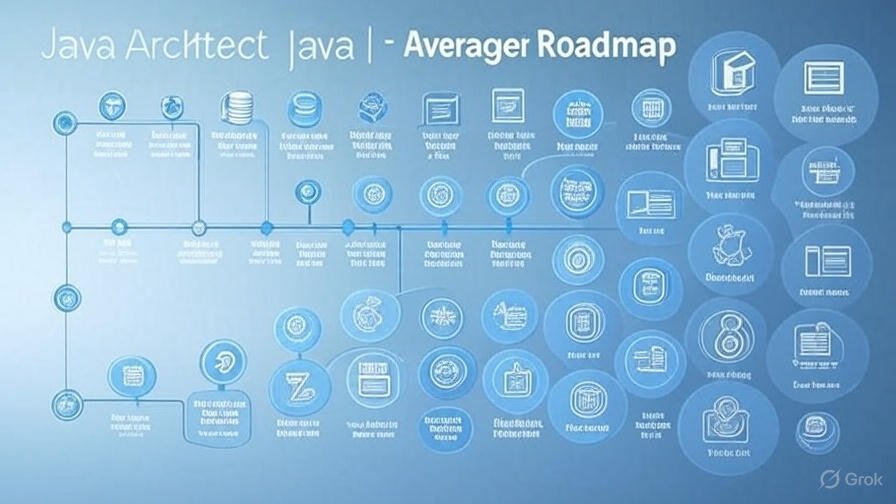
Java Architect Career Roadmap: Skills, Salary & Growth
Java Architect Career Roadmap: Skills, Salary & Growth
Embarking on a career as a Java Architect is both challenging and rewarding. This role demands a deep understanding of Java technologies, system design, and architectural principles. If you’re aiming to become a Java Architect, this guide will walk you through the essential skills, salary expectations, and growth opportunities. Let’s dive into the comprehensive roadmap for a successful career as a Java Architect.
Becoming a Java Architect requires a strategic approach to skill development and career planning. For those interested in formal certification, consider exploring java architect certification programs that can provide structured learning and industry recognition. Additionally, understanding the steps on how to become java architect can offer valuable insights into the career path and necessary milestones.
Skills Required for a Java Architect
Technical Skills
To excel as a Java Architect, you need a robust set of technical skills. These include:
- Proficiency in Java: A deep understanding of Java programming language, including its syntax, libraries, and frameworks.
- System Design: Ability to design scalable, reliable, and maintainable systems.
- Architectural Patterns: Knowledge of various architectural patterns such as MVC, Microservices, and Serverless.
- Database Management: Expertise in database design, SQL, and NoSQL databases.
- Cloud Computing: Familiarity with cloud platforms like AWS, Azure, or Google Cloud.
- DevOps Practices: Understanding of CI/CD pipelines, containerization, and orchestration tools like Docker and Kubernetes.
Soft Skills
In addition to technical skills, soft skills are crucial for a Java Architect:
- Communication: Ability to clearly convey complex technical concepts to non-technical stakeholders.
- Leadership: Skills to lead and mentor development teams.
- Problem-Solving: Aptitude for identifying and resolving complex issues.
- Project Management: Ability to manage projects, timelines, and resources effectively.
Educational Background and Certifications
Educational Requirements
A strong educational background is essential for a Java Architect. Most professionals in this role have a bachelor’s degree in Computer Science, Information Technology, or a related field. Advanced degrees, such as a master’s or Ph.D., can provide a competitive edge.
Certifications
Certifications can validate your skills and enhance your credibility. Some popular certifications for Java Architects include:
- Oracle Certified Master, Java EE Enterprise Architect
- AWS Certified Solutions Architect
- Microsoft Certified: Azure Solutions Architect Expert
- Google Professional Cloud Architect
Career Path and Growth Opportunities
Entry-Level Positions
Starting your career as a Java Developer is a common path. In this role, you’ll gain hands-on experience with Java programming, debugging, and testing. This foundational experience is crucial for understanding the intricacies of Java applications.
Mid-Level Positions
As you progress, you can move into roles such as Senior Java Developer or Software Engineer. These positions involve more complex tasks, including system design, code reviews, and mentoring junior developers.
Advanced Positions
With significant experience and expertise, you can transition into architectural roles. Positions like Java Architect or Solutions Architect involve designing and overseeing the implementation of large-scale systems. These roles require a deep understanding of both technical and business requirements.
Salary Expectations
Entry-Level Salaries
Entry-level Java Developers can expect to earn between $70,000 and $90,000 annually. Salaries vary based on location, company size, and industry.
Mid-Level Salaries
Mid-level professionals, such as Senior Java Developers, typically earn between $90,000 and $120,000 per year. These roles come with increased responsibilities and require a higher level of expertise.
Advanced-Level Salaries
Java Architects and Solutions Architects command higher salaries, ranging from $120,000 to $150,000 or more annually. These positions are critical to the success of large-scale projects and require extensive experience and leadership skills.
Industry Trends and Future Outlook
Current Trends
The demand for Java Architects is driven by the increasing complexity of software systems and the need for scalable, reliable solutions. Trends such as microservices architecture, cloud computing, and DevOps practices are shaping the role of Java Architects.
Future Outlook
The future looks bright for Java Architects. As businesses continue to digitalize and adopt advanced technologies, the need for skilled architects will grow. Staying updated with the latest trends and continuously enhancing your skills will be key to long-term success.
Building a Professional Network
Networking Opportunities
Building a professional network is essential for career growth. Attend industry conferences, join professional organizations, and participate in online forums. Networking can open doors to new opportunities and provide valuable insights into industry trends.
Mentorship
Seeking mentorship from experienced professionals can accelerate your career growth. Mentors can offer guidance, share their experiences, and provide valuable feedback. Similarly, mentoring others can enhance your leadership skills and expand your network.
Continuous Learning and Development
Online Courses and Workshops
Continuous learning is crucial for staying relevant in the ever-evolving tech industry. Enroll in online courses, attend workshops, and participate in webinars to keep your skills up-to-date.
Reading and Research
Regularly reading industry publications, research papers, and blogs can provide valuable insights into emerging technologies and best practices. Staying informed about the latest developments will help you make informed decisions and stay ahead of the curve.
Conclusion
A career as a Java Architect offers numerous opportunities for growth and advancement. By developing the necessary skills, obtaining relevant certifications, and building a strong professional network, you can achieve success in this dynamic field. The Java Architect career roadmap is filled with challenges and rewards, making it an exciting and fulfilling career choice.
FAQs
What is the role of a Java Architect?
A Java Architect is responsible for designing and overseeing the implementation of Java-based applications and systems. They ensure that the solutions are scalable, reliable, and meet business requirements.
What skills are essential for a Java Architect?
Essential skills for a Java Architect include proficiency in Java, system design, architectural patterns, database management, cloud computing, and DevOps practices. Soft skills such as communication, leadership, and problem-solving are also crucial.
What certifications are beneficial for a Java Architect?
Beneficial certifications for a Java Architect include Oracle Certified Master, Java EE Enterprise Architect, AWS Certified Solutions Architect, Microsoft Certified: Azure Solutions Architect Expert, and Google Professional Cloud Architect.
What is the career path for a Java Architect?
The career path for a Java Architect typically starts with entry-level positions such as Java Developer, progresses to mid-level roles like Senior Java Developer, and advances to architectural roles such as Java Architect or Solutions Architect.
What is the salary range for a Java Architect?
The salary range for a Java Architect varies based on experience, location, and industry. Entry-level positions can earn between $70,000 and $90,000 annually, mid-level roles between $90,000 and $120,000, and advanced positions can command salaries of $120,000 to $150,000 or more.
What are the current trends in the Java Architect field?
Current trends in the Java Architect field include microservices architecture, cloud computing, and DevOps practices. These trends are shaping the role of Java Architects and driving the demand for skilled professionals.
How can I build a professional network as a Java Architect?
Building a professional network as a Java Architect involves attending industry conferences, joining professional organizations, participating in online forums, and seeking mentorship. Networking can open doors to new opportunities and provide valuable insights into industry trends.
What is the future outlook for Java Architects?
The future outlook for Java Architects is positive, with increasing demand driven by the digitalization of businesses and the adoption of advanced technologies. Staying updated with the latest trends and continuously enhancing your skills will be key to long-term success.
How important is continuous learning for a Java Architect?
Continuous learning is crucial for a Java Architect to stay relevant in the ever-evolving tech industry. Enrolling in online courses, attending workshops, and participating in webinars can help keep your skills up-to-date.
What are the educational requirements for a Java Architect?
The educational requirements for a Java Architect typically include a bachelor’s degree in Computer Science, Information Technology, or a related field. Advanced degrees, such as a master’s or Ph.D., can provide a competitive edge.








